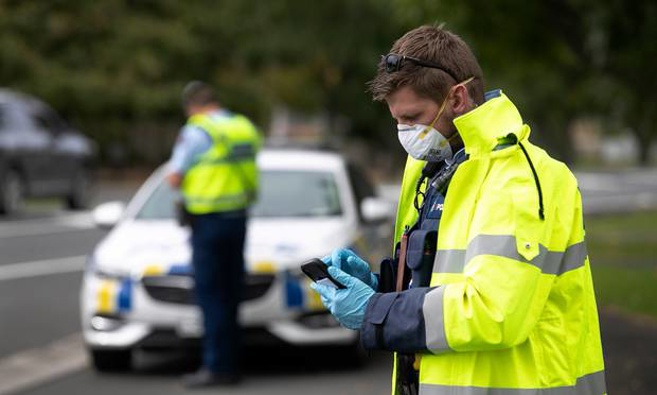Leaked emails from the police top brass show how legally exposed they felt when the country was ordered into lockdown in March.
Emails from Deputy Commissioner Mike Clement to district commanders and to the now Commissioner Andy Coster show a Crown Law opinion warning the police they had little or no power to enforce the lockdown.
That was the case for the first two weeks of the Government orders before the director general of health Ashley Bloomfield used the outdated Health Act to issue specific regulations.
Even then, experts believe that Act was the wrong one to use and that the Civil Defence Emergency Management Act would have been more appropriate.
Parliament's Regulation Review Committee has written to Bloomfield saying there are many questions over the lawfulness of the orders he's issued, in particular isolating and quarantining people who aren't sick and closing businesses.
And the legality of police action during levels 3 and 4 is still being questioned in legal quarters. Court of Appeal President Stephen Kos said last Friday the rules and how they are being applied has raised many questions.
Three days after the lockdown and before the regulations were enacted by Bloomfield, Clement emailed his officers telling them police powers did not extend to road blocks or pulling people over for the purpose of seeing whether they were complying with the lockdown.
The powers only come into play when a breach is obvious.
Clement said they "cannot direct anyone to do anything unless it is quite extreme in its nature and with direct and significant impacts for the health of others".
"It is unlawful to do so and we shouldn't be doing it."
The Deputy Commissioner repeatedly tells his officers they should be operating as though they are at level 1.
Prime Minister Jacinda Ardern says the Attorney General has been satisfied all powers have been appropriately used and says police have not been acting illegally during lockdown.
More clarity had been added over time to ensure additional powers have been used appropriately, she told Mike Hosking on on Monday morning.
She was confident that the lockdown was legal.
Interpreting the Crown Law opinion given to the Government, which they have repeatedly refused to release, Clement said "standard police powers to stop, search and surveillance must be exercised for their statutory purpose, and may not be used to assist police in the enforcement of the isolation campaign".
Police have been told that to minimise legal risk, they should use their "non-coercive community policing powers" to the greatest extent possible in encouraging compliance with the campaign.
Ardern told Hosking it was up to the Attorney General whether to release legal advice from Crown Law.
But it was worth stepping back and looking at whether the legislation used had been appropriate for the pandemic, Ardern said.
Pressed on whether certain iwi-led roadblocks were appropriate, Ardern said police should always be involved in road blocks - nobody else apart from Civil Defence had the right to turn people around on the road.
Hosking said there were gangs running roadblocks at Murupara. Ardern said that was not her understanding but nobody had the legal grounds to stop people without police involved.
Police Commissioner Andrew Coster told Hosking that Clement had sought clarity over the powers they could exercise. "He's saying it was important to operate within the law."
Coster revealed the number of road blocks set up by communities and iwi had fallen from 30 to 50 to about seven, and he was confident this would drop to zero soon. Police had earlier promised there would be police presence at all road blocks.
He said the case of an NZ Herald journalist who came across a road block without a police officer present in Northland happened after a police staff member was called away to a critical event. The staff member soon returned.
Coster told Hosking the journalist was based in Auckland hundreds of kilometres from home - in fact, the journalist lives and works from Kerikeri.
Meanwhile, when the police emails were read to him, National's police spokesman Mark Mitchell said he wasn't surprised at how vulnerable the police were feeling at the moment.
Mitchell, a former police officer, says many officers have approached him saying they're uneasy about enforcing the lockdown rules. They're afraid they don't have the legal standing the Government's been claiming they have.
Mitchell says when Parliament resumed last week, Government should have introduced urgent legislation to clarify the orders and give an assurance to police they were enforcing a law that was legal.
"This has been a mess right from the beginning and one can only hope the Government's not opening itself to legal challenge," Mitchell said.
"When it became apparent that there were legality issues with lockdown, we offered to assist the Government to pass legislation. The offer was declined.
"The Crown Law Office advice should have been made public," Mitchell said.
Meanwhile, Ardern told Hosking 700,000 flu jabs had not been "lost" - they were at GPs and pharmacies.
Asked about medical professionals saying they could not get access to flu jabs, Ardern said 451,000 vulnerable people had been vaccinated. An inventory of every GP office in the country showed there were 700,000 jabs out there but they needed to be moved around by DHB authorities within their regions. "We need to let them do their job."
"I would argue that DHBs need to take some responsibiltiy for making sure people have the flu jabs that they need."
The Government's job was getting more flu vaccines into the country - there were more this year than ever before.
"We've already focused on prioritising first as you would expect the most vulnerable...you do understand that I'm not personally responsible for the dispatch and logistics."
She agreed there were people having to try to find vaccines within their DHBs. "Clearly, we've heard those stories."
Take your Radio, Podcasts and Music with you










